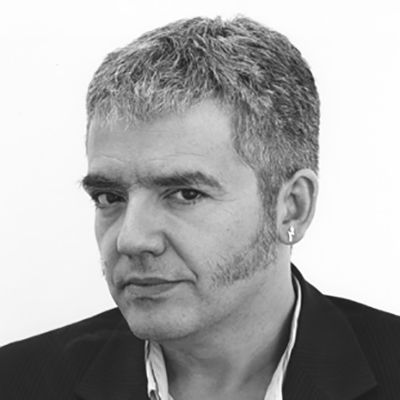Writing (’cos)
The more people ask me about it the less I know why, but I do write and I do it with pleasure even when they make me write about what I write, like now. I started early. As a kid. I poured my heart out in the compositions they asked me to do at school and also in the ones that were not asked for. Since I did this in Spanish, the narrator of those squared pages was someone else. A sort of invisible friend with whom I played at lying to tell great truths or vice versa in those long afternoons I spent by myself at home. Alone and happy, with my granny. Then came the summers of copying texts about some thirty countries that appeared in my Aguilar Atlas into spiral pads. One country, one pad; a terrible waste. One day in 1976, when I was still thirteen, something extraordinary happened. I was writing in one of those pads at the writing desk in my granny's room, with her bed to my left and, on my right, the glass of a door that opened on to an interior courtyard. Shouts of invisible demonstrators were rising from the street. I raised my head at one point and saw a strange face. The tenuous light of dusk only permitted a glimpse but those eyes that looked at me through the glass of the balcony door weren't those of the good boy that everyone wanted me to believe I was, or of the daredevil I thought I was. I didn't exist. As they shouted down in the street, I sat there enraptured, staring at that alien gaze. Looking at it without looking at me. And now I'm absolutely sure that, just then, I felt the supernatural certainty about my future writing which, I subsequently read, some other authors have felt. Some have even had photographs taken of themselves in an attempt to capture that moment. Twenty-seven years on, my writing keeps happily gushing forth, despite the fire and flame and floods of the game. I'm convinced that everything I've written and, in particular, everything I have yet to write, was already there that day. In the room where, two years later, my granny died as I held her hands. I've always written to strengthen that gaze without making it totally mine. Maybe out of fear. Recently I realised that the most important thing about that moment was not the gaze or the jolt of becoming aware of it, but the fact that what reflected it was not just a mirror. It was also transparent glass.
Marius Serra, Caràcters (Nº 22, January 2003)
Biographical Data
Barcelona, 1963. Writer and graduate in English Philology. The only foreign member of the Italian writers' group Oplepo (Opificio de Letteratura Potenziale).
He has published the novels Mon oncle (My Uncle – Proa, 1996), winner of the "Fundació Enciclopèdia Catalana" Prize, and AblanatanalbA (Edicions 62, 1999); books of short stories, for example La vida normal (The Normal Life – Proa 1998); and essays, for example Verbàlia. Jocs de paraules i esforços de l'enginy literari (Verbalia. Word Plays and Efforts of Literary Inventiveness – Empúries, 2000), winner of the Serra d'Or Critic's Prize and the Lletra d'Or Prize, 2000.
Among his translations are books by Edmund White, Tom Sharpe, Jayne Anne Phillips, Alexander Stuart and the dialogues of the Marx Brothers, Groucho i Chico, advocats (Groucho and Chico, Attorneys at Law, 1989), broadcast by Catalunya Ràdio (1990) and adapted for the stage by Pere Sagristà in the Jove Teatre Regina (1996).
He has been producing a weekly enigmystic –word-play– section in the daily Avui since 1989 and, since 1990, has been head of the daily crossword section of La Vanguardia.




